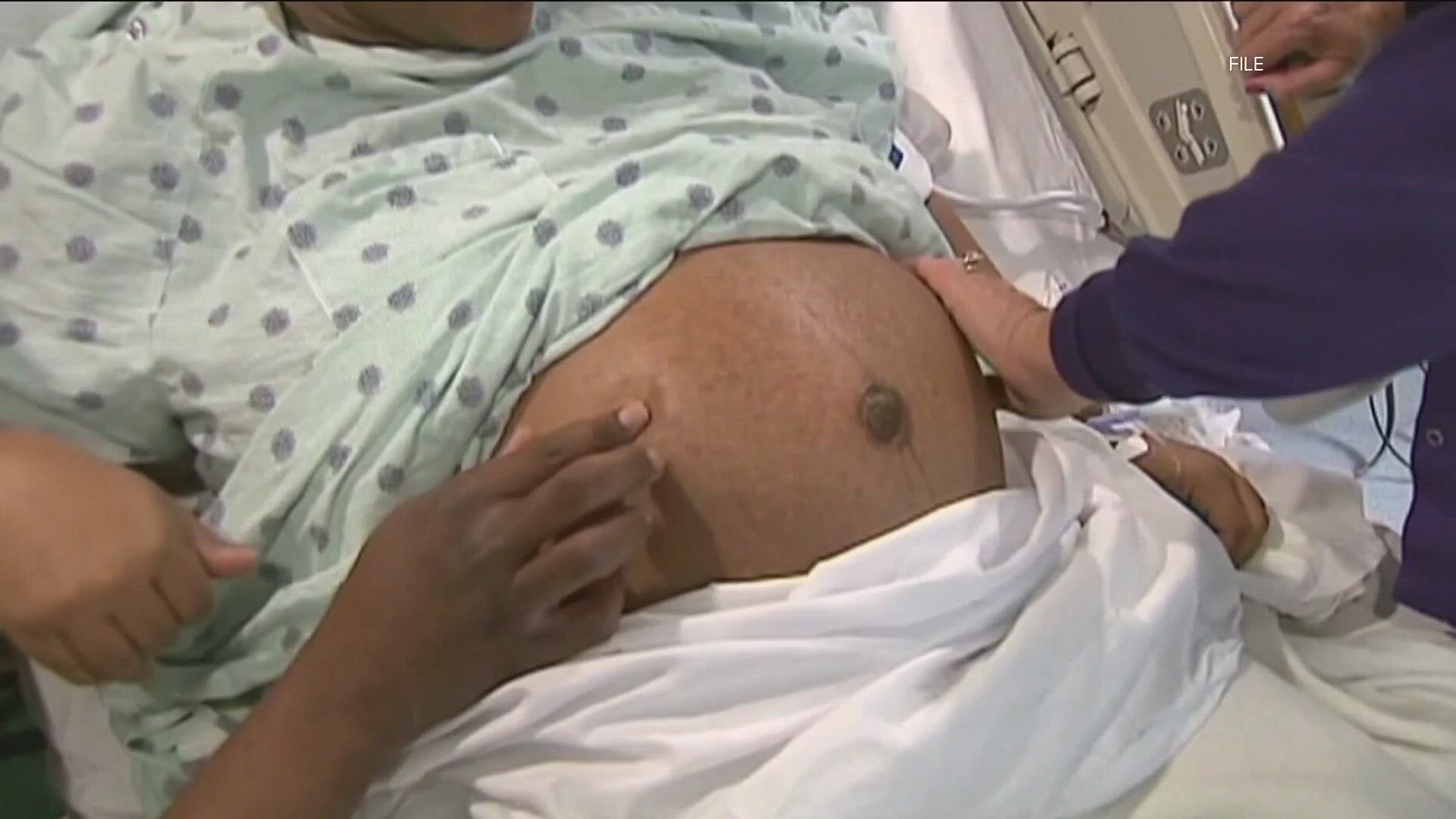ATLANTA — As Georgia continues to grapple with disparities when it comes to maternal health, state leaders are hoping a new pilot program will lead to better care and earlier intervention when it comes to protecting the health of mothers and babies.
It’s an issue close to the heart of Lisa Stafford-Johnson, who gave birth to her first child in February.
“I had never had any issues with high blood pressure, but because of age and ethnicity, we just watched it closely,” she explained. “Toward the end of my pregnancy, that's when I started having more issues.”
Stafford-Johnson works in healthcare and was constantly monitored throughout her pregnancy. But she said doctors urged her to have an unplanned C-section, bringing up worries and post-surgical complications Stafford-Johnson had not anticipated.
“It was a very scary experience and knowing what I know, it still didn't help,” she said.
Lisa’s not alone in such fears. While the state has not yet released its full report on the latest maternal mortality numbers, preliminary data shows inequalities continue. Black women in Georgia are more than twice as likely to die of pregnancy-related complications as white women, a fact sheet from DPH shows. Barriers to care also continue to be an issue state-wide.
“In Georgia, 20% of women still do not have access to any health care. We still have counties where there are no maternity care provider,” Dr. Natalie Hernandez, executive director for the Center for Maternal Health Equity at Morehouse School of Medicine and a member of the state’s Maternal Mortality Review Committee, explained. “We’ve had hospitals closing in in all areas within the state, and so if we want to make sure that these deaths are preventable, we need to invest in our health care system. We need to ensure that we have coordinated systems of care. We need to invest in our women and families.”
State officials are making efforts to increase that investment. On Tuesday, Governor Brian Kemp signed Senate Bill 106, “The Healthy Mothers Healthy Babies Act,” greenlighting plans for a new pilot program for home visiting in at-risk and underserved rural communities during pregnancy and early childhood.
The pilot program aims to bring care and public health staff into the lives of families, Diane Durrence, director in the Women, Children and Nursing Services Division of Georgia Department of Public Health, explained.
“The pilot that we're going to launch this summer will provide us an opportunity to do more frequent assessments,” she said. “Catch things like high blood pressure, any concerns with the baby… swelling during pregnancy, any of those kind of maternal warning signs.”
The goal is early intervention, Durrence added, with public health care staff bridging the gap between doctors’ appointments and helping families navigate the medical system. DPH is hoping to expand on success of programs like the Perinatal Health Partners program in Waycross, Georgia, which is already proving to be effective.
“I tend to have high-risk pregnancies,” Laquardia Matthews, who was monitored by a home visit nurse through the Waycross program, explained. Her own pregnancy health scares have ranged from gestational diabetes to preterm birth and preeclampsia.
“My biggest concern was my blood pressure,” Matthews said. “Because they say that’s like the silent killer.”
While medication helped stabilize her blood pressure initially, her home visit nurse recognized the need for more intervention, leading to a hospital stay.
“I didn't come home until I had a baby,” Matthews said. “So I was over there for a long time. But I was glad that I was there because anything could have happened.”
Yet, home visits not only take place during pregnancy but also during the postpartum period, when a woman returns home after giving birth. That can be a critical window for preventing maternal deaths, yet is a time when symptoms can be misunderstood or ignored, Hernandez explained.
“Really, it's when a woman goes home and she thinks that she's safe where complications can arise and maternal deaths happen,” Hernandez added.
Mom Morgan Reynolds also knows how critical such support can be. Her diabetes was not managed during her first pregnancy, and she also suffered from an incompetent cervix. Unchecked, Reynolds went into labor while at home during her second trimester, without realizing what was happening.
“When I did make it to the hospital, it was too late unfortunately,” she told 11Alive. “She was born at 21 weeks.
After tragically losing her baby girl, Reynolds got pregnant again, but this time was monitored by a home visit nurse at Perinatal Health Partners. Her insulin and cervix were properly monitored, leading to a healthy delivery of her baby boy Emerick.
But even after her son’s birth, Morgan leaned on her nurse as she coped with the loss of her first child. .
“A lot of people forget that mental health is still your health,” Reynolds shared. “I don't think that a lot of people talk about postpartum because it's just a touchy subject. My postpartum depression was terrible because I felt so much guilt that my body had felt me that first time.”
Grateful for the support, Reynolds now hopes to encourage other mothers to participate in home visit programs as DPH builds its pilot in Georgia. The pilot program is expected to launch in July in eight counties in S. Georgia and five counties in N. Georgia, all in areas which have struggled with poor maternal and infant outcomes.
While Governor Kemp has not yet signed the state budget, the program is estimated to cost $1.7 million, while requiring DPH to report back on updates and effectiveness of the pilot by December 31, 2024. State leaders would then evaluate whether the program should expand state-wide.
“Sometimes all people need are those social supports,” Hernandez added. “They need someone to meet them where they're at.

